
fno.org
|
|
| Vol 16|No 1|October|2006 | |
| Please feel free to e-mail this article to a friend, a principal, a parent, a colleague, a teacher librarian, a college professor, a poet, a magician, a vendor, an artist, a juggler, a student, a news reporter or anyone you think might enjoy it. | |||
Managing
by Jamie McKenzie
|
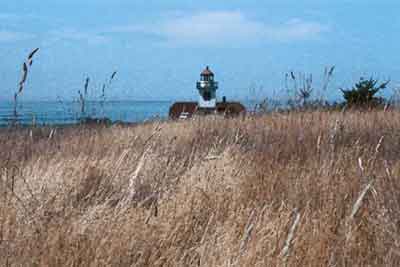 |
||
|
The Web offers so much information that students may find themselves effectively starved and frustrated, lost and overwhelmed. The masses of documents and images confront them with what amounts to the poverty of abundance. Unless they can find the image or the document they need, the heaps of material may serve to obscure rather than reveal or illuminate. Schools must equip the young with powerful search strategies so they can manage this challenge, ferreting out material that is pertinent and reliable. A simple search in Google for "China" returns more than a billion Web pages! On October 3, Google offered 1,220,000,000 pages for China. Note the round number and seven zeroes. Are they really counting? How many of those pages are about china plates?
What is search logic? Search logic is the thoughtful combination of search terms - much like a boxer's combinations of punches - that allows the researcher to eliminate irrelevant information and focus on the most promising sources. Take a look at your options at Google's Advanced Search http://www.google.com/advanced_search Google's Advanced Search offers a series of search boxes, each of which can help you to focus your search. Looking for climate information to help decide which of six Chinese cities has the least rain? 1. with the exact phrase allows you to enter "average annual rainfall" so the 1,220,000,000 pages for China becomes just 90,900, still too many for most of us to read, but great progress. 2. without the words allows you to enter "plates, hotels, food" so the 90,900 pages for China becomes just 26,000, still too many for most of us to read, but more great progress. 3. Language allows you to select "English" so the 26,000 pages for China becomes 23,800. 4. Domain allows you to enter ".gov.cn" for Web pages from the Chinese government so the 23,800 become just 40. We have come closer to the needle in the haystack! Search results click here. How do teachers and students learn search logic?
A Google search for "search logic" "professional development" and "school" turned up just 282 Web pages. We quickly move from the poverty of abundance to slim pickings. There are very few useful resources or proven models to guide schools. Every school district should check its professional development offerings to make sure that each teacher has a chance to learn search logic using activities like "Searching for the Grail: Learning How to Find Quality Information" available at http://fnopress.com/search.html. Most search engines offer tips and resources to strengthen search skills. Google's can be found at http://www.google.com/intl/en/help/refinesearch.html. Students should also be taught search logic and the use of advanced search engines so they can zero in on sources that will actually shed light on their questions. This instruction can be provided by teacher-librarians as part of an explicit series of lessons in information literacy skills but should also be incorporated in subject areas where research is frequent expected. Figuring out how to use each site There are hundreds of rich Web sites that offer huge collections of documents, artifacts and images. Unfortunately, many of these are not organized to support efficient searching and there are few recipes or menus that can be transferred from site to site. The researching student must figure out how to make each of these work. This will usually require some reading of site specific help pages as well as some trial-and-error efforts. Example One - Corbis.Com - When you can easily find what you want In contrast to the next three sites, Corbis.Com, which is selling images to advertising agencies, has constructed an image collection with meta tags and key words that allow you to search through tens of thousands of images and find just what you want without wasting time. Search for "kittens drinking milk" and you get thumbnails of kittens drinking milk. Search for "old woman playing poker" you get NO RESULTS. Search for "old woman playing cards" you get 17 images. Search for "crying young student" you get some very sad pictures. If all Web sites offering images, documents and artifacts had databases constructed with the skill of Corbis, we and our students would suffer much less from the poverty of abundance. Example Two - PictureAustralia.Org This is a resource rich site that allows a researcher to search across the collections of dozens of museums and other sites:
The beauty of this site - its capacity to search the collections of so many institutions - is also its biggest disadvantage. The results of searches can be massive. If you use the simple search for "Captain Cook" and search all the collections, you will get 611 images, many of which seem irrelevant because so many places now use his name. It takes skill and ingenuity to separate the pertinent from the extraneous. If you go to Advanced Search and search for "Captain James Cook" with quotation marks, you get just 94 images, most of which are portraits. The basic search only looks at title, creator, subject, date or place. Advanced search looks at all fields. Thus, basic search turns up 48 images of kitten while advanced search turns up 81 images. The advantage of using a site like this one repeatedly over time is the chance to figure out where to look for good historical portraits or items of special interest. Unfortunately, most students rarely perform research over an extended period of time and do not have many opportunities to learn the special characteristics of particular sites. Looking over the results for "Captain James Cook" we might note that the State Library of NSW, the National Library of Australia, and the National Archives of Australia seem to have the richest collections. Sometimes it works best to look at the list of participating institutions listed as "Whose Images" at http://www.pictureaustralia.org/providers.html and then search one of those sites rather than search across dozens of museums. Example Three - Library of Congress American Memory Collection This is another resource rich site that can prove frustrating, especially since its digital collection is much smaller than its main collection. Many online visitors assume that they will be able to find just about everything they might ever want to know about the American experience at this site, but the digital collection is far from comprehensive, and the list of topics not covered is much longer than the list that is covered. Sometimes it works better to browse the list of subject headings or collections to find out what is there before conducting a more targeted search. When you compare what the Library offers in the way of resources devoted to Culture & Folklife (34 collections), the list is surprisingly brief. Click to see list of collections. While some of these 34 collections are real treasures - The North American Indian, a collection of photographs by Edward S. Curtis being just one example - the list does not come close to capturing the American experience. Example Four - The Thinker The Fine Arts Museums of San Francisco offer 82,000 images online, but it is sometimes difficult to find what you want. The database, originally designed for inventory purposes, does not offer enough words (meta tags) describing theme and content of each image. Winslow Homer's painting "A Swell of the Ocean" evokes many deep feelings and touches upon essential human issues, but few of these are listed in the meta tags that accompany the painting. Take a look at the painting and then note the limited words chosen to describe this painting. Click here.
While this painting might inspire many viewers to consider such concepts as fate, death, courage, faith, will, fear and loss, those concepts are not listed, so this painting will not appear when searching for them. In all too many cases dealing with concepts, the database at The Thinker does not actually show what the collection has to offer. If you search for images with the word courage, you get just nine images back. All of these have "courage" in their titles. "Swell of the Ocean" and many others that explore courage as a theme are missed.
Info-Glut
The Web can be a wasteland (glossary) http://www.fno.org/may96/glossary.html#wasteland Credits: The photographs in this article were shot by Jamie McKenzie. |
|||
You can read sample chapters and consider the Table of Contents. Click here.
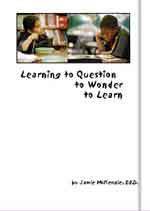
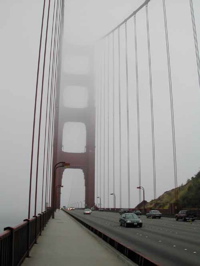
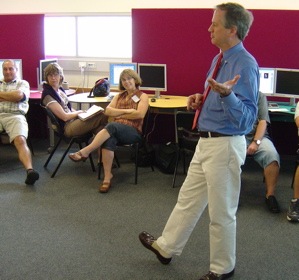
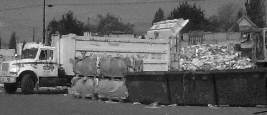 In 1996 FNO warned of this problem . . .
In 1996 FNO warned of this problem . . .